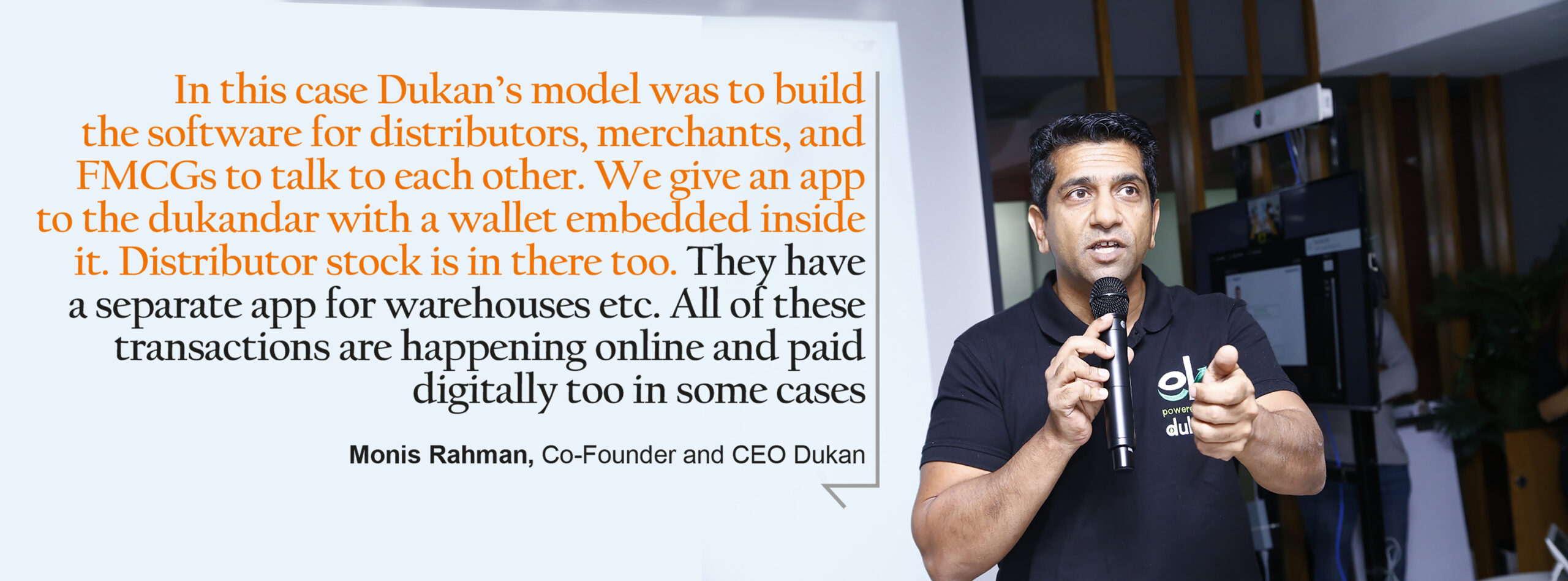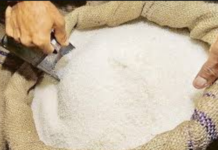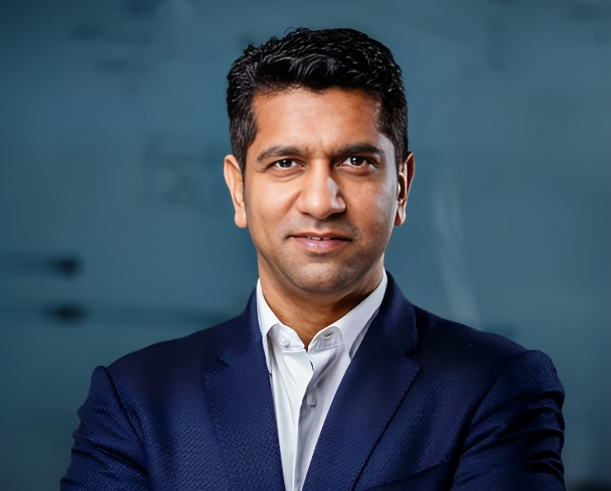What does the average startup founder look like in Pakistan? Young, motivated, preferably educated in the United States, disruptive (a word used to death across the globe by now), and committed to the cause of solving problems.
Monis Rahman fits this description perfectly. The only difference between him and the many young men and women that are making their mark in the startup ecosystem is that he has been doing this for much longer. In fact Monis’ first entry to Pakistan as a startup founder was more than two decades ago in 2003.
In this time Monis has launched multiple successful and unsuccessful startups. He made his mark with the online employment portal called Rozee, which was the first Pakistani startup to receive VC funding. And now, at the age of 53, he is set to embark on his next venture.
Dukan, Monis’ latest foray, was born out of the Covid crisis and is a digital commerce, payments, and lending ecosystem geared towards the country’s five million micro, small, and medium enterprises (MSMEs). The aim is to connect these businesses and provide them with supply chain solutions.
Now, after going through layoffs and the funding slowdown of last year, Dukan is going in a different direction. To hear Monis speak of it, this new venture might be something that has possibly never been done before in the world and never before in Pakistan. In partnership with easypaisa, Dukan is powering a one-stop solution for Pakistan’s micro, small, and medium enterprises (MSMEs). The platform, which is being launched under the name as easypaisa Karobar is a fully integrated end to end solution for end stage retailers as well as the supply chain. It offers both in-app online payment facilities and more importantly the option to borrow money through easypaisa.
How will Dukan fare with this new project? What needs to be understood is that Pakistan’s startup ecosystem is very different from what it was a few years ago. Funding is not as easy to come by as it was in previous years. On top of this, a lot of founders have had to learn the lesson that good business fundamentals are as important as disruption and innovation.
For those familiar with how startups work, the failure rate is very high. Globally, around 90% of startups are bound to fail. Around 10% of these fail within the first year and a further 70% fail between years two through five. The ones that survive global catastrophes and funding crunches are the ones that make it to the other side of the tunnel.
But these are all things Monis Rahman knew both before and during the startup boom in Pakistan. He was, after all, a part of the startup culture of Silicon Valley in the late 90s. And that is also where our story begins.
The Silicon Valley spirit
Monis Rahman did graduate work from Stanford University in 1996 in Computer Engineering. In a way, he really didn’t have a choice. Because back in the late 90s and even to this day, Stanford University is a feeding ground for Silicon Valley. In many ways if you are a Stanford grad, you don’t choose the startup life, it chooses you.
Up until 1997, Rahman was working for Intel as part of their microprocessing design team. He spent two years there before getting his first taste of being a founder with eDaycare.com, a platform that provided online video streaming and related applications to over 3,000 daycare centres in the United States. At the time United States was going through its funding and startup boom. In many ways it was an eerily similar situation to what we saw in Pakistan between 2018 and 2021.

“There are so many analogies I can draw with the 1999 VC coup in the United States. I could write a book just based on this very phenomenon”, Monis tells Profit. At his offices in Gulberg Lahore, Monis very much cuts the figure of the startup founder. At 53 he does not look his age. Energetic and a smooth talker, there is a slight Californian tilt in his accent that speaks to his years in the United States.
“This was an era where tech was the place to invest. Much like we saw in Pakistan, everyone was worried about missing out on the opportunity and was investing left, right, and centre grabbing at any opportunity they got,” he explains.
During this time Monis learned, he grew, and he imbibed in himself the spirit of Silicon Valley. In 2003 it was time for a big shift. His parents had just retired and were planning on moving back to Pakistan. He decided to move with them. But the Pakistan Monis arrived back in was very different from the one we see today. The country was vastly behind the rest of the world when it came to tech. The internet was a fairly new contraption in people’s households and mobile bandwidth data was a long way away. The banking industry had just been reformed under the Musharraf regime and Pakistan was still in the early stages of privatising its financial system.
The economy however, was thriving. The military regime had shaken hands with the United States in the post 9/11 world and Pakistan was a key ally in the war on terror. With the aid dollars flowing in, reserves were swelling and urban Pakistan was partying. Interest rates were low, unemployment was even lower, and this was the time that was squarely in the boom category before the bust arrived.
Which is why when Monis said he would bring the same Silicon Valley ethos to Pakistan he was labelled a madman. “This is not the US, people would say to me”, he tells us with a chuckle. “They said I was crazy to come back to Pakistan and would be back in the United States in a month”. Indeed Pakistan had very little regulatory framework at the time to suggest a startup culture could be fostered. Yet Monis was determined, and that is where his twenty year journey begins.
Willing to fail
The first project was Naseeb.com. For any person that was a young adult in the early 2000s, this was a Muslim centric social media platform similar to Facebook. “Naseeb emerged because I knew engineering was cheap in Pakistan and we could leverage a similar boom in Pakistan as was seen in the US.” While it started off as a regular social media website Naseeb eventually started to serve the purpose that all online forums eventually do — matchmaking.
While the platform was geared towards Muslim communities in the United States and in the UK, Naseeb Networks, Inc., was registered both in Lahore, Pakistan, and in San Jose, California, US, to make it easier to raise money and investors. According to a Forbes article, Monis spent $60,000 as a startup cost for Naseeb and initially handled the company on his own.
The website became a way to meet new people and families. “There are so many people I know and I’m sure you know as well who met through Naseeb. Eventually we started charging a premium and initially people were willing to pay. The problem was that this was the same time as other social media platforms like Facebook were becoming popular. These guys were not charging money and were angling to go towards a business model where there would be ad based revenue. The Muslim market was unfortunately not big enough for us to try this gamble which is why Naseeb started to slow down.”
It was at this time as well, however, when Monis would almost stumble into the venture that is perhaps his most defining. You see, between 2002 and 2005 Naseeb had grown significantly. While it had started off as an operation he began from his home, Monis eventually needed employees. And remember, this was the era where internet accessibility was just starting off, so people either got jobs by dropping physical CVs or responding to classified ads in the newspapers. This was expensive and difficult. As a tech founder, Monis thought he would create an online portal to help him hire for Naseeb.
The response to the initial website he developed was overwhelming. Other than helping him in his hiring needs, other companies also started approaching him to post their job ads on his platform. This is where it struck Monis that this was where money was to be made. By 2007 the newly minted website called “Rozee” was pulling bigger numbers in traffic than Naseeb. The company became the first Pakistani startup to receive VC funding. It currently boasts more than 65,000 employers that use the platform to find new talent.
An undercooked market
The success of Rozee cannot be attributed to the fact that it was a startup at a time when the concept of startups was far from conception in Pakistan. If anything, it can be said that Rozee succeeded despite this. “We started to make money. We were charging for our services and this was really the first time that online shopping was taking place in Pakistan. We built the software ourselves and all the big banks asked us for it as well. It was fun solving these problems”, Monis explains.
But there were other more systemic problems in the ecosystem. To collect payment, Rozee’s sales teams often had to go and collect cheques, often of low denomination, themselves. There was no such thing as online payments at the time. And this is where Monis saw his next opportunity — financial technology.
The State Bank of Pakistan had launched its first introduced regulatory framework for branchless banking in 2008, and the same was subsequently revised in 2011 based on the market developments and international best practices. The Branchless Banking Regulations of SBP are an effort towards achieving the objectives of an increasing access to basic banking services and an inclusive financial system that best serves all segments of the society.
Monis was already interested in fixing this payment problem. He had faced it firsthand during his time at Rozee with his team having to go door to door to collect the payment. On top of this he also had a number of friends that had been part of the initial teams over at PayPal. Which is why when Roshaneh Zafar asked him to join the board of the Kashf Microfinance Bank he jumped at the opportunity. Ms Zafar had created the first specialised microfinance organisation in Pakistan, the Kashf Foundation, in 1996 which has served over 5 million women entrepreneurs across Pakistan.
Kashf was truly a pioneering effort in microfinance in Pakistan and had the added benefit of targeting a user base that is still vastly underrepresented in Pakistani financial spaces and was much worse off in the 1990s. Over at the bank Monis sat on the board and was a trusted advisor. For three years he served in this capacity until November 2013 when Kashf was acquired by FINCA — a global microfinance network.
FINCA came in bearing a large equity investment of more than Rs 820 million. And this is also where the idea for Finja sprang from. After working with FINCA for a while, Monis along with the company helped to launch Finja which was initially meant to create Pakistan’s first mobile wallet.
Essentially, Finja would create and provide the software and FINCA would use their banking licence. It was through this partnership that SimSim, would be born in 2017. This was the first time a bank and a fintech company, acting as the super-agent of the bank, partnered to create a digital financial product under the branchless banking framework approved by the State Bank of Pakistan
There was much hype around SimSim when it was first launched. They completed the first ever retail QR code in Pakistan. In a display of showmanship, Monis made a deal with a Biryani seller outside Hafeez Centre where the offices of Rozee and SimSim were located. They paid the biryani vendor for the day and sold a plate each for Rs 100 — all people had to do was download the SimSim app and make the QR payments through this. The resulting video from this gimmick garnered a lot of attention for SimSim.
But this would also be a project that would face many hurdles. While SimSim was the first Pakistani company to introduce a mobile wallet, they were given fierce competition by JazzCash and Easypaisa. These companies had a massive existing user base and leveraged that to bring users on board. On top of this, there was the problem that mobile wallets as a business have very high acquisition costs and very high churn.
“We raised a million dollars and weren’t going to burn through a quarter of that on acquisition costs and marketing. We learned about loans, lending, etc and we pioneered supply chain loans instead. We created that model but then Covid hit.”
Dancing with the young ones
By 2020 Monis Rahman had seen mostly everything. He had seen firsthand the startup boom in Silicon Valley in 1999 and was initially the lone startup warrior in Pakistan. He created a number of successful and unsuccessful startups, most notably Rozee and SimSim. In the twenty years where all of this was happening, changes were underway in Pakistan’s startup ecosystem. Airlift, Bazaar, Sadapay, Nayapay, Jugnu, Dastagir, and many others raised major rounds and there was a lot of buzz around startups.
During this time it seemed there was no stopping startup funding. Covid was also a major moment where startups had a chance to make an impact. It was in this boom and time of lockdown that Monis identified another area where startup disruption could work — the country’s Micro, Small, and Medium enterprises (MSMEs). “I started to work with the stores in the market near my house. Started sitting in Kiryana stores to try and understand and thought what if we go online for these guys and it is quite complicated. That is how the Dukan app was born. The goal was to digitise commerce for everyone,” he explains.
MSMEs really are a vastly ignored segment in Pakistan. Most people in Pakistan have unregistered and small businesses. In fact, 80% of Pakistan’s non-agricultural labour is employed by SMEs. On top of this, the problem is that banks do not lend to these organisations because of bureaucratic barriers to entry.
The Dukan chapter
The concept behind Dukan was that it would give anyone with a smartphone the ability to build their own webstore. The startup had seemingly been on an impressive growth trajectory. According to a press release published on August 3, 2021, the startup announced having onboarded 100,000 small businesses in Pakistan that built their e-commerce stores using Dukan.pk mobile app, only five months after starting operations. In October, Dukan.pk claimed that the web stores had reached the 200,000 mark, doubling in two months.
But then came the funding crunch. Pakistan’s startup ecosystem poster-child Airlift announced shutting down its operations completely as VC funding started drying up, not only in Pakistan, but also globally. Earlier, Airlift announced laying off 31% of its workforce in a bid to increase its runway amid fundraising woes. Startups like Bykea, Truck It In, Retailo, and Tajir also discretely laid off employees as capital becomes scarce and startups are forced to adopt austerity measures to become sustainable.
It was in the middle of this that Dukan laid off about 25 percent of its workforce as startups across the globe adopt austerity measures due to a drying up of VC funding. “When there is an abundance of capital you don’t think it will ever dry up. But all startups go through this. There are always waves of lay-offs and it is how dedicated you remain to your thesis that counts.”
Many startups did not survive during 2021. Airlift was the first to go and then others fell in quick succession. But Dukan, through measures such as lay-offs and being stingy with funding, has managed to not just survive up until now, but, according to Monis, has also become profitable. The plan had always been to find a sustainable business model. Their latest ploy is easypaisa Karobar.
The easypaisa Karobar gambit
The announcement came last week, with a press release announcing that easypaisa, Pakistan’s leading digital financial services platform has launched easypaisa Karobar powered by Dukan to address the unmet banking needs of two million retail merchants across the country. Being Pakistan’s first digital banking app for retailers, easypaisa Karobar enables merchants to manage their financing needs digitally, reduce operational complexities, and become part of the digital economy.
It should be remembered that easypaisa has recently been successful in acquiring a hotly contested competition for a digital banking licence. The objective from the SBP for giving these licences was simple: Pakistan has a huge unbanked population with access to finance statistics nothing short of being terrible. The central bank has been edging towards increasing the financial inclusion numbers and it has been gunning to do so by moving its focus on digital financial services.
Which is why easypaisa is now launching the easypaisa Karobar application. To understand this in simpler terms, Dukan has essentially entered into a partnership with easypaisa. One option Dukan had was that they could sell their software. There has been a lot of talk about how MSMEs in Pakistan can be better utilised. As an employer, MSMEs account for the largest component of the labour force outside of the agricultural market. The problem is that these businesses operate in an old school fashion. Small retailers rarely have access to financial institutions and find it hard to find capital since banks do not lend to them. The concept here is that MSMEs will have an integrated application where they can order supplies, make payments, and also borrow money based on credit ratings provided by Dukan.
But instead of selling the software, Dukan has entered a partnership with easypaisa. While the easypaisa Karobar application will be controlled on the PlayStore by easypaisa, it will be hosted entirely by Dukan. Both of the organisations have put in place controls to grow the partnership together. But the plan is for Dukan to continue selling such software to other companies in other markets, in partnerships and taking a cut off the earnings.
“In this case Dukan’s model was to build the software for distributors, merchants, and FMCGs to talk to each other. We give an app to the dukandar with a wallet embedded inside it. Distributor stock is in there too. They have a separate app for warehouses etc. All of these transactions are happening online and paid digitally too,” explains Monis. “We give this real time data for scoring to whoever we have as a partner, in this case easypaisa. They get real time data and in exchange give real time loans.
Payments can be made and collected as well. This is ecommerce integrated with banking. Easypaisa has white labelled the Dukan platform and that will be called the easypaisa Karobar app. That is the reason the SBP gave all these licences because they wanted them to lend to SMEs.”
The company claims that easypaisa Karobar would streamline merchant operations with advanced features, enabling cashless payments from the easypaisa Wallet to distributors. The company claims that merchants can also order stock online from distributors and digitise their workflows.
“As a fintech company providing digital banking and e-commerce infrastructure to connect retailers, distributors, and manufacturers with embedded financial services, we are delighted to partner with easypaisa. This first-of-its-kind partnership acts as a strong alignment of vision between Dukan and easypaisa to bring prosperity to small offline businesses through digitization at scale,” says Monis.
What is Monis’ plan?
Most startup founders that emerged from the post-2018 boom are now in their early 30s – which is the age Monis first came back to Pakistan in. But somehow Monis manages to fit in very well. Very responsive to phone calls from the press, when this correspondent called him for an interview the phone went unanswered. He called back within five minutes and requested a little time to call back. “I’m in between sets at the gym. Let me finish and call you right back,” he said.
“I haven’t gotten fit to fit an image,” he tells us. While this may be true it definitely helps him look the part in the youth dominated world of startups. “There was a time when I gained a lot of weight sitting behind a desk but I have always been athletic and this is simply a part of that,” he says with a chuckle.
As things stand he along with other startup founders are trying their best to make gains at a difficult time. The dizzying highs seen by tech-startups all over the world have been brought down to abysmal lows by the brutal claws of a market that is persistently bearish in the face of rising inflation and a global recession. Major tech players including Apple, Microsoft, Amazon, and Google have taken significant stock hits, shaking investor confidence and almost overnight making funding for startups scarcer than it has been in years.
There are two ways to deal with this. The first is to cut costs and try to get by on the funding that they already have in the bank until the global recession ends and VCs are ready to back them again. This we are already seeing in the massive layoffs and downsizing. The key, however, will be finding internal cash sources. Startups that can cut costs and find streams of revenue to break even or be slightly profitable will eventually be the winners.
That is the ethos that Monis wants to imbibe in his projects. “Even if we have millions of VC dollars we are not going to burn it all on acquisition costs,” he explains. The key here is and always has been integrating the startup spirit with good business fundamentals. It will be the startups that manage to set up good business models that will survive the storm and thrive when the tide turns.


























Interesting article . Need clarity as to the role of an investor in easy paisa karobar app . Can you advise whom to reach out . My name e mail as follows